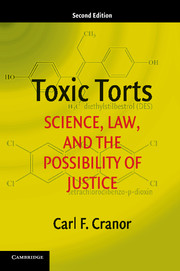Book contents
- Frontmatter
- Dedication
- Contents
- Preface
- Acknowledgments
- 1 The Veil of Science over Tort Law Policy
- 2 Legal Background
- 3 Institutional Concerns about the Supreme Court's Trilogy
- 4 Evidence of Toxicity
- 5 Scientific Reasoning and Some Applications
- 6 Excellent Evidence Makes Bad Law: Pragmatic Barriers to the Discovery of Harm and Fair Admissibility Decisions
- 7 Science and Law in Conflict
- 8 Milward v. Acuity Specialty Products: Toward Clarifying Legal and Scientific Issues
- 9 Enhancing the Possibility of Justice Under Daubert
- 10 What has Daubert Wrought?
- Bibliography
- Index
8 - Milward v. Acuity Specialty Products: Toward Clarifying Legal and Scientific Issues
Published online by Cambridge University Press: 05 May 2016
- Frontmatter
- Dedication
- Contents
- Preface
- Acknowledgments
- 1 The Veil of Science over Tort Law Policy
- 2 Legal Background
- 3 Institutional Concerns about the Supreme Court's Trilogy
- 4 Evidence of Toxicity
- 5 Scientific Reasoning and Some Applications
- 6 Excellent Evidence Makes Bad Law: Pragmatic Barriers to the Discovery of Harm and Fair Admissibility Decisions
- 7 Science and Law in Conflict
- 8 Milward v. Acuity Specialty Products: Toward Clarifying Legal and Scientific Issues
- 9 Enhancing the Possibility of Justice Under Daubert
- 10 What has Daubert Wrought?
- Bibliography
- Index
Summary
Recall from Chapter I that Mr. Brian Milward was diagnosed with Acute Promylelocytic Leukemia (APL), a very rare type of Acute Myelogenous Leukemia (AML) that only occurs in about one in 1,000,000 people. Mr. Milward and his wife, Linda, brought tort law claims in negligence against twenty-two defendant companies who manufactured products containing benzene that Mr. Milward had used as a refrigerator repairman. He had worked in this capacity from 1973 to 2007. Benzene has been known to cause AML since the 1960s. The companies neither listed benzene as an ingredient, nor warned consumers that the products contained a known cancer-causing substance. In his work, Mr. Milward breathed vapors containing benzene for many hours each day and sometimes would get it on his skin, after which it entered his blood stream.
FINDING A LAWYER
The Milwards contacted Steven Baughman Jensen of Allen Stewart P.C., to present their case. Since graduating from law school Steve had had concerns about environmental degradation and harm to citizens caused by toxicants in the environment. Like many plaintiffs’ lawyers he was passionate about protecting the public from chemical risks, or failing that, finding compensation for injuries they suffered that could be traceable to chemical exposures. Moreover, following the Daubert and Joiner decisions, he had become a substantial critic of how lower courts were implementing them and how the defense bar was attacking the science underlying expert testimony.
After carefully considering the Milwards’ case, Steve concluded that there was a reasonable scientific and legal basis for a court to compensate the Milwards. The trial had been bifurcated into general causation claims and specific causation claims to be considered in that order so his first order of business was to address general causation. However, he knew that he had to anticipate and address potential weaknesses to better ensure the case would be successful.
CHOOSING EXPERTS
In designing the litigation plan he sought out Martyn Smith, one of the best benzene experts in the country, Professor of Toxicology in the School of Public Health at the University of California, Berkeley. Martyn is extremely well known and highly respected for his work in toxicology and his work on benzene in particular.
- Type
- Chapter
- Information
- Toxic TortsScience, Law, and the Possibility of Justice, pp. 272 - 291Publisher: Cambridge University PressPrint publication year: 2016



